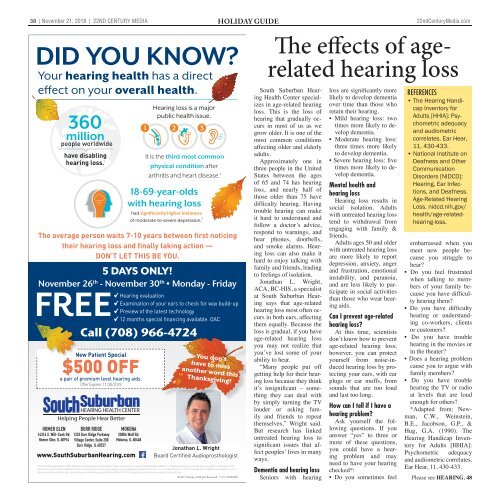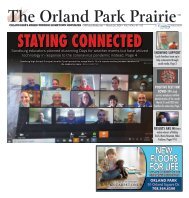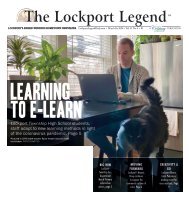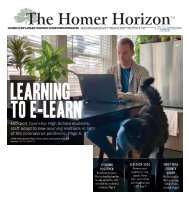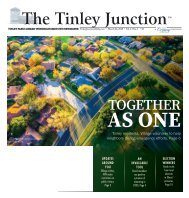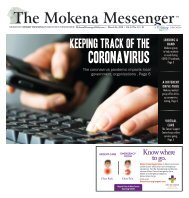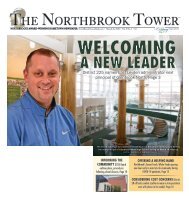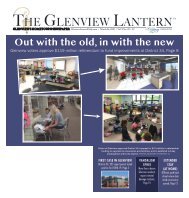You also want an ePaper? Increase the reach of your titles
YUMPU automatically turns print PDFs into web optimized ePapers that Google loves.
38 | November 21, 2<strong>01</strong>8 | 22ND CENTURY MEDIA HOLIDAY GUIDE<br />
22ndCenturyMedia.com<br />
DID YOU KNOW?<br />
Your hearing health has a direct<br />
effect on your overall health.<br />
360<br />
million<br />
people worldwide<br />
have disabling<br />
hearing loss. 1<br />
The average person waits 7-10 years between first noticing<br />
their hearing loss and finally taking action —<br />
DON’T LET THIS BE YOU.<br />
5 DAYS ONLY!<br />
November 26 th - November 30 th • Monday - Friday<br />
FREE<br />
12<br />
HOMER GLEN<br />
14316 S. Will-Cook Rd.<br />
Homer Glen, IL 60914<br />
New Patient Special<br />
$500 OFF<br />
a pair of premium level hearing aids.<br />
Offer Expires: 11/30/2<strong>01</strong>8<br />
HEARING HEALTH CENTER<br />
Helping People Hear Better<br />
BURR RIDGE<br />
1333 Burr Ridge Parkway<br />
Village Center, Suite 200<br />
Burr Ridge, IL 60527<br />
www.SouthSuburbanHearing.com<br />
Hearing loss is a major<br />
public health issue.<br />
1 2 3<br />
It is the third most common<br />
physical condition after<br />
arthritis and heart disease. 2<br />
18-69-year-olds<br />
with hearing loss<br />
had significantly higher instances<br />
of moderate-to-severe depression. 3<br />
Hearing evaluation<br />
Examination of your ears to check for wax build-up<br />
Preview of the latest technology<br />
months special financing available. OAC<br />
Call (708) 966-4724<br />
MOKENA<br />
20006 Wolf Rd.<br />
Mokena, IL 60448<br />
You don’t<br />
have to miss<br />
another word this<br />
Thanksgiving!<br />
Jonathan L. Wright<br />
Board Certified Audioprosthologist<br />
1 World Health Organization. (2<strong>01</strong>5). Deafness and hearing loss. Retrieved from: http://www.who.int/mediacentre/factsheets/fs300/en/ | 2 National Academy on an Aging Society. (1999). Challenges for the<br />
21st Century: Chronic and Disabling Conditions. Retrieved from: http://www.agingsociety.org/agingsociety/pdf/chronic.pdf | 3 Li, C. M. & Hoffman, H. J. (2<strong>01</strong>4). Untangling the Link Between Hearing Loss and<br />
Depression. Retrieved from: http://journals.lww.com/thehearingjournal/Fulltext/2<strong>01</strong>4/07000/Untangling_the_Link_Between_Hearing_Loss_and.2.aspx<br />
© 2<strong>01</strong>7 Starkey. All Rights Reserved. 11/17 187981230<br />
The effects of agerelated<br />
hearing loss<br />
South Suburban Hearing<br />
Health Center specializes<br />
in age-related hearing<br />
loss. This is the loss of<br />
hearing that gradually occurs<br />
in most of us as we<br />
grow older. It is one of the<br />
most common conditions<br />
affecting older and elderly<br />
adults.<br />
Approximately one in<br />
three people in the United<br />
States between the ages<br />
of 65 and 74 has hearing<br />
loss, and nearly half of<br />
those older than 75 have<br />
difficulty hearing. Having<br />
trouble hearing can make<br />
it hard to understand and<br />
follow a doctor’s advice,<br />
respond to warnings, and<br />
hear phones, doorbells,<br />
and smoke alarms. Hearing<br />
loss can also make it<br />
hard to enjoy talking with<br />
family and friends, leading<br />
to feelings of isolation.<br />
Jonathan L. Wright,<br />
ACA, BC-HIS, a specialist<br />
at South Suburban Hearing<br />
says that age-related<br />
hearing loss most often occurs<br />
in both ears, affecting<br />
them equally. Because the<br />
loss is gradual, if you have<br />
age-related hearing loss<br />
you may not realize that<br />
you’ve lost some of your<br />
ability to hear.<br />
“Many people put off<br />
getting help for their hearing<br />
loss because they think<br />
it’s insignificant – something<br />
they can deal with<br />
by simply turning the TV<br />
louder or asking family<br />
and friends to repeat<br />
themselves,” Wright said.<br />
But research has linked<br />
untreated hearing loss to<br />
significant issues that affect<br />
peoples’ lives in many<br />
ways.<br />
Dementia and hearing loss<br />
Seniors with hearing<br />
loss are significantly more<br />
likely to develop dementia<br />
over time than those who<br />
retain their hearing.<br />
• Mild hearing loss: two<br />
times more likely to develop<br />
dementia.<br />
• Moderate hearing loss:<br />
three times more likely<br />
to develop dementia.<br />
• Severe hearing loss: five<br />
times more likely to develop<br />
dementia.<br />
Mental health and<br />
hearing loss<br />
Hearing loss results in<br />
social isolation. Adults<br />
with untreated hearing loss<br />
tend to withdrawal from<br />
engaging with family &<br />
friends.<br />
Adults ages 50 and older<br />
with untreated hearing loss<br />
are more likely to report<br />
depression, anxiety, anger<br />
and frustration, emotional<br />
instability, and paranoia,<br />
and are less likely to participate<br />
in social activities<br />
than those who wear hearing<br />
aids.<br />
Can I prevent age-related<br />
hearing loss?<br />
At this time, scientists<br />
don’t know how to prevent<br />
age-related hearing loss;<br />
however, you can protect<br />
yourself from noise-induced<br />
hearing loss by protecting<br />
your ears, with ear<br />
plugs or ear muffs, from<br />
sounds that are too loud<br />
and last too long.<br />
How can I tell if I have a<br />
hearing problem?<br />
Ask yourself the following<br />
questions. If you<br />
answer “yes” to three or<br />
more of these questions,<br />
you could have a hearing<br />
problem and may<br />
need to have your hearing<br />
checked*:<br />
• Do you sometimes feel<br />
REFERENCES<br />
• The Hearing Handicap<br />
Inventory for<br />
Adults [HHIA]: Psychometric<br />
adequacy<br />
and audiometric<br />
correlates. Ear Hear,<br />
11, 430-433.<br />
• National Institute on<br />
Deafness and Other<br />
Communication<br />
Disorders [NIDCD]:<br />
Hearing, Ear Infections,<br />
and Deafness.<br />
Age-Related Hearing<br />
Loss. nidcd.nih.gov/<br />
health/age-relatedhearing-loss.<br />
embarrassed when you<br />
meet new people because<br />
you struggle to<br />
hear?<br />
• Do you feel frustrated<br />
when talking to members<br />
of your family because<br />
you have difficulty<br />
hearing them?<br />
• Do you have difficulty<br />
hearing or understanding<br />
co-workers, clients<br />
or customers?<br />
• Do you have trouble<br />
hearing in the movies or<br />
in the theater?<br />
• Does a hearing problem<br />
cause you to argue with<br />
family members?<br />
• Do you have trouble<br />
hearing the TV or radio<br />
at levels that are loud<br />
enough for others?<br />
*Adapted from: Newman,<br />
C.W., Weinstein,<br />
B.E., Jacobson, G.P., &<br />
Hug, G.A. (1990). The<br />
Hearing Handicap Inventory<br />
for Adults [HHIA]:<br />
Psychometric adequacy<br />
and audiometric correlates.<br />
Ear Hear, 11, 430-433.<br />
Please see HEARING, 48


